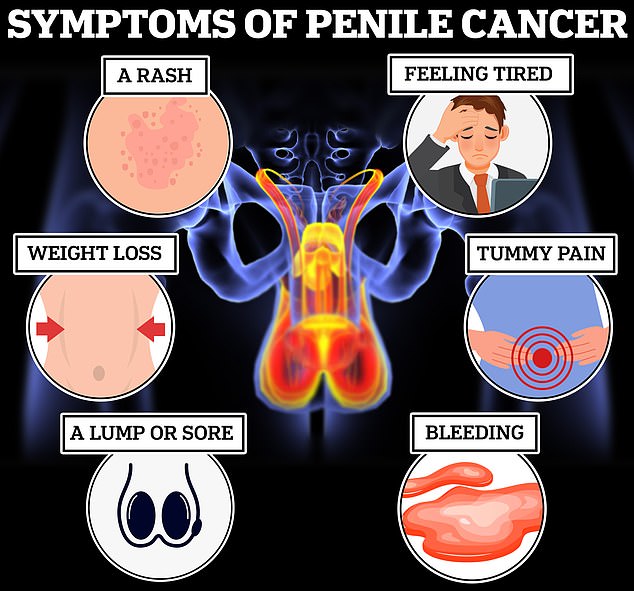A man says he felt like a “freak” after a rare penile cancer forced him to amputate his manhood two days before Christmas.
Shaun Evans, 55, from Wolverhampton, said he initially dismissed what looked like a “nasty bruise” on the organ but became far more concerned when he noticed blood while showering and what looked like a cold sore at the base of his penis.
He told his doctor, who was treating him after he suffered a heart attack earlier that year, and referred him to a specialist.
Although Mr Evans’ doctor suspected penile cancer, doctors needed to perform a biopsy to be sure and give him the diagnosis.
But the blood-thinning drugs he needed after his heart attack meant this had to be delayed for months and while he waited, Mr Evans’ symptoms left him in such agony he could not even walk.
Shaun Evans, 55, from Wolverhampton, said it initially felt like a “nasty bruise” but became concerned when he noticed blood while in the shower in June 2022.

He was given the devastating news that his penis would likely need to be amputated and underwent the operation in December 2022 to have it removed, two days before Christmas.
Finally, when he received his diagnosis, months after experiencing the first symptoms, he was given the devastating news that not only did he have penile cancer, but the best course of action was to amputate his manhood.
Mr Evans underwent life-changing surgery just two days before Christmas in 2022.
Now, after learning to live without a penis and hoping to raise awareness of the condition, Mr Evans says he has accepted the amputation and is happy to be able to walk without pain.
While there is a chance he could have his penis reconstructed, he will have to wait as doctors require patients to be cancer-free for five years before approving the surgery.
Mr Evans, who previously worked in police support, said his period after amputation “was the loneliest I’ve ever felt in my life”.
“It was just a numbness. It can seriously affect masculinity,” he said.
‘I went through all the emotions. I thought, “I’m a weirdo,” “no one’s going to love you.”
“This is the new Shaun. People will accept you as you are.”

Penile cancer is rare in the UK, with only about 760 new cases diagnosed each year, according to Cancer Research UK. But cases are predicted to rise to 1,100 a year in the UK by 2038-2040. A growth or sore on the penis, a foul-smelling discharge, bleeding, a rash or difficulty retracting the foreskin are all telltale signs of cancer.

Mr Evans noticed what looked like a cold sore at the base of his penis and mentioned his symptoms to his cardiologist while he was having his heart checked.
Mr Evans has already had a tough start to 2022, losing his mother, Sheila, 86, in March and then suffering a heart attack in April.
And in June of that year, just as he was beginning to feel like his old self, he felt a discomfort in his groin.
He recalls: “I started to feel uncomfortable. I had a pain down there. It was like a very bad bruise.
‘In July, I was taking a shower and noticed some water-diluted blood coming out of my penis.
“I got a little scared. I got alarmed.”

Doctors thought he had penile cancer, but nothing had been confirmed yet and Evans dismissed that possible diagnosis.
He then noticed what looked like a cold sore at the base of his penis and mentioned his symptoms to his cardiologist while he was getting his heart checked.
He was sent to a reception centre and examined before being referred to a specialist consultant there.
Doctors thought he had penile cancer, but they needed a biopsy to confirm it.
However, because Mr. Evans was taking blood thinners for his heart attack, this procedure had to be delayed as the drugs can increase the risk of dangerous blood loss.
With nothing confirmed, Mr. Evans ruled out the possible diagnosis.
However, her symptoms progressively worsened and she eventually suffered so much pain that she called an ambulance.
Mr Evans said: “The swelling had turned into a huge lump. It was horrible.”
‘I could just shuffle.’
He went for an ultrasound and was told he had an abscess on his penis, a collection of pus, and that he would need surgery to drain it.
Mr Evans was taken to Heartlands Hospital in Birmingham and given antibiotics in October 2022.
However, also because of the anticoagulants, he was forced to wait for the abscess operation.
Mr Evans eventually underwent surgery to drain the abscess in November 2022 and remained hospitalised for three weeks.
Recalling the aftermath of the procedure, Mr Evans said: “It didn’t feel like a part of my body anymore,” he said.
Mr Evans’ long-awaited biopsy was performed at the same time as the abscess drainage and tragically on 15 December 2022 he received the devastating news that he had penile cancer.
And in a further blow, doctors told him they would probably need to remove his penis.
“I kind of knew. I thought, ‘How the hell is this going to go back to normal? ‘ Obviously, I was devastated,” he said.
Mr Evans recalls waking up in Heartlands Hospital after his five-hour amputation on December 23, 2022.

Since the operation, she has been regaining her independence and has an ultrasound every three months to check that she is still cancer-free.
“On Christmas Day the consultant came to see me and explained that I had to do it,” Evans recalled.
“She said, ‘I had to take it out. I think I’ve got it all. I’ve managed to retain what’s beneath the surface.'”
Among the life-altering changes Mr Evans had to get used to was being able to urinate only while sitting down, as doctors had rearranged the position of his urethra, the internal tube through which urine is expelled from the body.
“I go to the bathroom like a lady,” she said.
Since the operation, Mr Evans has regained his independence and undergoes a scan every three months to check that he remains cancer-free.
He said: “I’m taking it day by day. It’s the little things, like being able to sit up.”
Mr Evans also said he hopes sharing his story will raise awareness of penile cancer, a rare and aggressive cancer, as experts revealed cases are expected to rise.
Penile cancer is rare in the UK – only around 760 new cases are diagnosed each year, according to Cancer Research UK.
But cases are projected to rise to 1,100 a year in the UK between 2038 and 2040.
A growth or sore on the penis, a foul-smelling discharge, bleeding, a rash, or difficulty pulling back the foreskin are all telltale signs of cancer.

